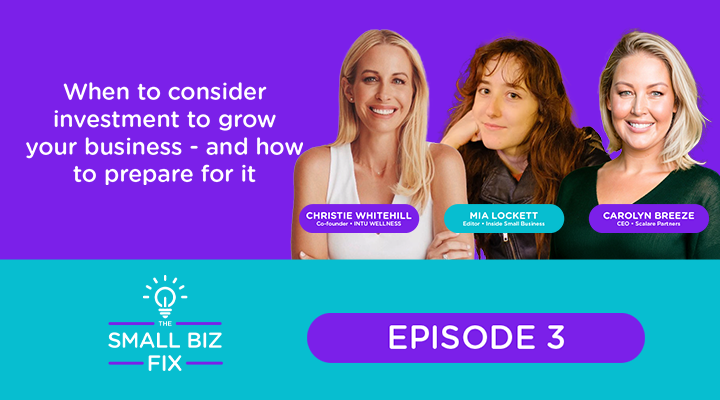In this episode of The Small Biz Fix, we spoke to investor Carolyn Breeze and serial entrepreneur Christie Whitehill about how investment newbies can prepare for their first raise – and decide if investment is for them in the first place. Listen to the episode to find out how to start, where to find the right investor for you, and how you can pitch and negotiate for biz-changing resources.
Tune into any form of business news these days and you’ll hear about the latest start-up that’s just raised millions through venture capitalists. It’s an exciting world full of big, bold growth stories – and for a lot of business owners, it can start to feel like the ultimate benchmark for success.
But that narrative can be misleading.
“It’s really easy – and culturally accepted – that VC funding or a capital injection is like the silver bullet to growing your business,” says Carolyn Breeze, CEO of Scalare Partners. “But what we don’t talk about when we see these articles with people raising big amounts of money is how much of their business they’ve actually given away for that capital.”
Carolyn is an investor and mentor who has helped hundreds of small-business owners decide if raising capital is the right move – and, if so, when and how to do it well.
Talking to Inside Small Business Editor Mia Lockett on this episode of The Small Biz Fix podcast, Carolyn mentioned a few things you should do now if you think investment is in your business’ future. Here they are:
1. Define your investment “why”
It’s easy to get caught up in the excitement and glamour of start-up culture and believe that you need investors to “make it”. But investment is not a silver bullet, says Carolyn Breeze, CEO of Scalare Partners – it’s a huge commitment. Not only are you giving away a slice of your business, you’re also putting yourself under big time pressure, in some cases.
“There’s time pressure on your business when you take VC funding,” she says. “You need to be meeting certain milestones and heading towards a certain exit in a certain amount of time.”
There are many reasons why investment might not be for you. If you do decide to do a capital raise, have a firm grasp of your “why”. We discuss the factors to consider in the podcast, but as a quick point of reference, let’s look at Christie Whitehill – the founder of INTU Wellness, who shares her investment journey on this episode.
The reason that Christie chose investment for her venture was to respond to growth opportunities that were already on the table.
“We’d had some really great traction in the market, sales and revenue was fantastic, and we also had our contract with Mecca on the table,” she recounts. “Raising allowed us to grow a lot faster.”
In other words, if you don’t have a strong reason for needing investment, you’re probably better off considering other forms of funding instead.
2. Know when the right – and wrong – time to raise capital is
Let’s say big things are on the horizon for your business – new customers, a big retail client, or an exciting product launch. You might consider this the perfect time to woo an investor with promises of big growth and a generous ROI.
But Carolyn recommends you pause and think about it before you go running to your closest VC firm.
“If you can see the horizon to some kind of revenue and some wins pretty early, I would hold off if you can, because it means that your business is going to be worth a lot more post those customers coming on and using your product or service,” she says.
Carolyn says that some business owners come to her looking for investment to finish that last little bit of their product, or hire a few people, in order to secure an important client. In these cases, she recommends they consider lending – or a grant.
Of course, it all depends on your situation – in Christie Whitehill’s case, she decided investment was the way to go. But Christie says that it wasn’t just money she was after when she was facing down the big deal with Mecca. What she wanted were advisors who happened to have a financial stake in the business. Her investors had all built big retail brands before, so she knew she was getting their invaluable expertise, not just their money.
“We needed that support because I don’t think businesses can grow on their own,” she says. “They grow because of a whole heap of people believing in them and making them happen.”
3. Start building your network now
Christie says she started speaking to investors well before she wanted the money. She established relationships by asking for coffee catchups and advice from investors in her industry.
“I say, ‘Hey, I just want to have a coffee or 15 minute call. I just want to tell you what we’re working on – it’d be great to get some advice from you,’” she says. “Then I say, ‘Can I stay in touch and keep you updated as to what we’re doing?’”
While you can look for investors on websites like Airtree Ventures, Christie says she uses networking avenues – like LinkedIn or even her child’s soccer game – to make connections.
Meeting investors well in advance also means you’re able to vet them first. The last thing you want is to bring someone on to your company who turns out not to align with your values and beliefs.
4. Capital raising is a full-time job – start preparing early
For Christie, the journey from decision to raise was eight months.
“It was about a two month process just to pull together the documents I needed,” she says. “And that was me working full time just on the cap raising process. So it’s definitely a time consuming process. Anyone that is thinking about it, it doesn’t happen overnight.”
It might take longer than you think to get your business ready to pitch, so getting ready now could be a good idea. If you’re brand new to investment, get educated now so you know what you need. Resources like this podcast could be a good starting point, or there are a variety of websites out there that can give you an overview.















